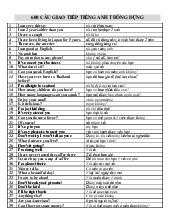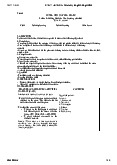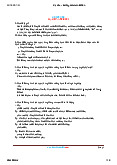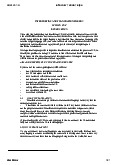





Preview text:
00:10 29/7/24 TACN 2
EU pulls its gun on China
The EU is accelerating its crackdown on what it sees as Beijing’s unfair support for
companies that undermine European rivals.
BRUSSELS — Europe's phoney war with China is at an end. After years of building up an
improved arsenal for a trade war, Europe is now showing it is willing to get tough on Beijing.
On Tuesday, EU investigators swooped on the Dutch and Polish offices of Nuctech, a maker
of security scanners, in a case that hinges on one of Europe's longest running grievances with
China — lavish state subsidies that help Chinese firms undercut European rivals.
Nuctech was once run by Hu Haifeng, son of President Xi Jinping's predecessor, Hu Jintao,
and China's reaction was predictably seething. The raid "highlights the further deterioration
of the EU's business environment and sends an extremely negative signal to all foreign
companies," China's mission to the EU . fumed
The timing of such an inflammatory raid seems significant, ahead of a trip to Europe by Xi
next month — his first in five years, taking him to France, Serbia and Hungary — marking a
definitive shift in the way that Europe is prepared to tackle its trade problems with China.
For years, Brussels has repeatedly taken an emollient tone with Beijing, seeking ultimately
futile dialogue on state subsidies and overcapacity in sectors such as steel, aluminum and
green tech, rather than choosing direct confrontation and a tit-for-tat trade war.
Now the gloves are off — as the political consensus grows that Europe needs to protect core
technologies. The writing has been on the wall since October, when the EU launched a probe
into China's state support of electric vehicles. Brussels has now followed up with
investigations into wind turbines and hospital equipment to "rebalance the EU-China partnership."
“We like fair competition. What we don't like is when China floods the market with
massively subsidized e-cars. That is what we are fighting against. Competition yes, dumping
no. That must be our motto,” European Commission President Ursula von der Leyen said on Wednesday. Using the new weapons
For the best part of a decade, the European Commission has been drawing up a stronger
arsenal of trade defenses, but the big question has always been whether Brussels was
prepared to use them, or whether they were primarily only a deterrent.
These include the International Procurement Instrument — used for the first time in this
week's medical technology case — which looks to take action against China if it boxes
European companies out of public tenders.
“For a long time, we talked about the European Commission having this toolbox. But we
questioned the ability of the European Commission to use this toolbox effectively. Now we
see that actually the European Commission is able and willing to use it,” said Francesca
Ghiretti, a senior geoeconomics analyst at the Adarga Research Institute.
Gunnar Wiegand, the ex-top diplomat on Asia at the European External Action Service and
distinguished fellow at the German Marshall Fund of the U.S., also insisted the new trade
weapons had always been designed for deployment, not just for show. about:blank 1/6 00:10 29/7/24 TACN 2
“Nobody should be surprised that the instruments which have been created in quite a long
process over the last few years are now finally, actually being used,” he said. Message to Washington
Europe's tougher stance carries advantages and dangers. On the one hand, the EU's more
robust position on China is an olive branch to hawkish allies in the U.S., who have often been
disappointed with Europe's softly-softly approach. But it also means Europe needs to be
ready for a counter-attack from Beijing and a stormy period of trade conflict.
The U.S. is definitely watching the new EU game plan closely. Immediately after this week's
announcement of a medical devices probe, U.S. Trade Representative Katherine Tai said she
was following with “interest," stressing the close collaboration between the two sides in
“identifying and exploring ways to address the non-market policies and practices used by
[China] in a range of sectors, including medical devices.”
The subsidy investigations are not the only sign of Brussels' stiffening resolve to tackle
Beijing more directly. There is also growing pressure inside the EU to mount a more realistic
challenge to China's massive Belt and Road infrastructure investment projects — where
Beijing extends its strategic reach by helping build ports and roads to link Asia to European markets.
Europe's early attempts to rival Belt and Road were seen as damp squibs, but an internal
Commission document obtained by POLITICO says the bloc must now focus more seriously
on building footholds in key strategic mining and energy interests in Africa and Central Asia.
In the clothing sector, Brussels is also gearing up to deal with the market impacts posed by
the Chinese app Shein. Two people familiar with the impending decision said Brussels was
close to designating Shein as a "very large online platform" in the coming days, exposing it to
extra scrutiny under the bloc’s content moderation law. Ready for retaliation
The question now is to see where — and how — Beijing will retaliate.
Each time Europe ups its ante on trade, China tends to have an answer. In various standoffs,
China has proved expert at playing EU countries off against each other in games of divide
and rule, threatening, for example, to favor Boeing planes over Airbus, or not to buy French and Spanish wine.
Using exactly those kinds of tactics, China forced then-EU Trade Commissioner Karel De
Gucht to back down from his 2013 offensive against Beijing's telecoms and solar industry.
More recently, China played the "rare earths" card, taking action against the supply of
gallium and germanium, two materials used in chipmaking after the U.S. pressured the
Netherlands to block some of the sales to China of advanced chipmaking gear by local champion ASML.
When asked about the increasing deployment of the EU trade arsenal, Anders Ahnlid, head of
Sweden's national trade board, said: “The Commission should do everything to avoid an
all-out trade war with China.”
“We need to act on evidence,” he added.
In a classic sign of China's asymmetric approach, shortly after von der Leyen launched her
high-profile investigation into made-in-China electric vehicles, Beijing hit Europe’s liquor about:blank 2/6 00:10 29/7/24 TACN 2
exports, in a move that seemed particularly tailored to France's cognac sector. Paris was the
chief proponent of the electric vehicle case.
But despite those threats of retaliation, von der Leyen has little room to keep her powder dry,
particularly as she fights to win a second term as Commission president — a move that would
require support from France, the main advocate of protecting European industry from China.
“If von der Leyen did not pull the trigger now, then when?” said one EU diplomat, referring
to the upcoming elections at the start of June.
The readiness to go harder on China also comes as Europe rethinks its dependencies on
autocracies after the Russian invasion of Ukraine.
“In the past, we made the mistake of becoming dependent on Russian oil and gas. We must
not repeat that mistake with China, depending on its money, its raw materials and its
technologies,” NATO Secretary-General Jens Stoltenberg told an audience in Berlin on Thursday.
Germany has been wary of confrontation with Beijing, for example, because it makes cars
there and has become dependent on China's massive consumer market.
But Wiegand, the ex-EU diplomat on Asia, said Europe should not live in fear.
“There's always a risk of retaliation … However, it is something which should not dissuade
anyone in the EU to make use of carefully designed instruments, which are all fully
WTO-compatible,” Wiegand said.
“It would be an error if there was no use made of the instruments for fear of retaliation.”
Pieter Haeck and Clothilde Goujard contributed reporting.
Rishi Sunak promised to make AI safe. Big Tech’s not playing ball.
A ‘landmark’ AI testing deal hailed by the UK leader is being shunned by the emerging
tech’s biggest players including OpenAI and Meta.
LONDON — At an historic gathering in Bletchley Park late last year, American tech
luminaries including Sam Altman and Elon Musk agreed to share their closely guarded
artificial intelligence models with the British government, in what was billed as a major coup
for the country’s digital-savvy prime minister.
Six months later, however, Rishi Sunak’s AI Safety Institute (AISI) is failing to test the safety
of most leading AI models like GPT-5 before they’re released — despite heralding a
“landmark” deal to check them for big security threats.
London’s difficulty in getting under the bonnet of AI systems to check they're safe shows the
limits of voluntary commitments from individual countries in the absence of hard legislation.
And it’s prompting calls for the U.S. and U.K. to do much more to join the dots on AI rules.
POLITICO spoke to a host of company insiders, external consultants, lobbyists and
government officials over several months for this piece. Most were granted anonymity to
speak candidly about sensitive negotiations between the U.K. government and the tech companies.
“You can’t have these AI companies jumping through hoops in each and every single
different jurisdiction, and from our point of view of course our principal relationship is with
the U.S. AI Safety Institute,” Meta’s president of global affairs Nick Clegg — a former
British deputy prime minister — told POLITICO on the sidelines of an event in London this month. about:blank 3/6 00:10 29/7/24 TACN 2
“I think everybody in Silicon Valley is very keen to see whether the U.S. and U.K. institutes
work out a way of working together before we work out how to work with them,” said Clegg.
Britain’s faltering efforts to test the most advanced forms of the technology behind popular
chatbots like ChatGPT before release come as companies ready their next generation of
increasingly powerful AI models.
OpenAI and Meta are set to roll out their next batch of AI models imminently. Yet neither has
granted access to the U.K.’s AI Safety Institute to do pre-release testing, according to four people close to the matter.
The new models — OpenAI’s GPT-5 and Meta’s Llama-3 — will show progress in solving
hard problems in AI such as reasoning and memory, the companies have said.
Other models released since the British prime minister indicated he had secured voluntary
commitments to share pre-deployment access from eight of the world’s leading AI firms also
haven’t been tested by the AISI prior to their release.
Leading AI firm Anthropic, which rolled out its latest batch of models in March, has yet to
allow the U.K. institute to test its models pre-release, though co-founder Jack Clark told
POLITICO it is working with the body on how pre-deployment testing by governments might work.
“Pre-deployment testing is a nice idea but very difficult to implement,” said Clark. ‘First in the world’
Under the agreement, announced at the close of the AI Safety Summit in November, Sunak
said leading tech companies had agreed to subject their models to pre-release testing to
mitigate potential threats to national security in areas like bio-terrorism, cybersecurity and
loss of control of the systems themselves.
“Like-minded governments and AI companies have today reached a landmark agreement. We
will work together on testing the safety of new AI models before they are released,” Sunak promised at the time.
The government has since repeatedly said it has begun pre-deployment testing for potentially
harmful capabilities on advanced AI systems — though it has not identified specific models it
has tested, citing commercial sensitivity.
“Our institute is the first institute in the world to be doing pre- and post-deployment testing in
line with the agreement that we made at Bletchley Park,” U.K. Technology Secretary
Michelle Donelan told the House of Commons recently when asked whether the AISI had
been given access to the tech firms’ latest models. “Where risks are found, we do expect
relevant action to be taken,” she added.
But, six months after the Bletchley summit, the AISI has only managed to gain access to
models after, rather than before, they are released in the majority of cases.
Of the leading AI labs, only London-headquartered Google DeepMind has allowed anything
approaching pre-deployment access, with the AISI doing tests on its most capable Gemini
models before they were fully released, according to two people
POLITICO was unable to determine whether other leading tech companies that took part in
the Bletchley process, including Elon Musk’s xAI, France’s Mistral, Microsoft and
Microsoft-backed AI lab Inflection, are in negotiations with the U.K. AISI to do testing. about:blank 4/6 00:10 29/7/24 TACN 2
While Sunak's government has repeatedly said it will not rush to legislate for AI, it has said it
eventually expects to bring in “targeted, binding requirements” for the most advanced general-purpose systems.
Those binding requirements would be considered if the government is "not sufficiently
confident that voluntary measures would be implemented effectively by all relevant parties," it has said.
The opposition Labour Party, which is expected to form the next government, has also said it
will bring in legal requirements for the most powerful models.
Pulling the jurisdiction card
Fears of leaking valuable technology secrets to competitors have been among the companies’
chief qualms about granting the U.K. AISI deeper access, as well as the testing process
delaying product rollouts in a fiercely competitive market, according to several people.
In the absence of explicit requirements, there is also confusion among the companies about
what exactly the U.K. AISI is after. The science of evaluating AI systems is also in its infancy.
Another stumbling block has been jurisdiction.
The firms — which mostly hail from the United States — have been uneasy granting the
U.K. privileged access to their models out of the fear of setting a precedent they will then
need to follow if similar testing requirements crop up around the world, according to
conversations with several company insiders.
As well as the U.S. and U.K. institutes, countries including Singapore and Japan have
recently launched new government bodies aimed at AI safety, while the EU’s AI Office will
be tasked with enforcing the new law against powerful general-purpose versions of the technology.
The U.K. hopes a new memorandum of understanding between its AISI and its U.S.
counterpart will break the deadlock with the mostly American companies unwilling to deepen
access to their models. A lobbyist at a U.S. tech company said they would have fewer qualms
in working with the U.K. AISI following the memorandum of understanding between London and Washington.
But it is unclear how the new transatlantic accord will shift the dial in practice.
London and Washington had been clear from the outset that their two AISIs would work
together, and Britain’s Donelan told POLITICO the latest agreement between the U.K. and
the U.S. was predominantly about formalizing their existing arrangement.
The two institutes also have different functions. While the U.S. body can require developers
of the most powerful AI systems to provide safety test results, it currently has no direct
testing mandate. However, the two institutes have pledged to do at least one joint safety test
on a publicly available model and to develop tests for the most advanced models.
“We can make sure … we’re dividing and conquering on this agenda so that we can be much
more effective when it comes to prioritizing the safety of AI,” said Donelan on the agreement's significance.
'We cannot rely on goodwill' about:blank 5/6 00:10 29/7/24 TACN 2
Meta and Google DeepMind declined to comment for this piece, though Google DeepMind
has previously said that the U.K. AISI had access to some of its “most capable models” for
research and safety purposes and “to build expertise and capability for the long term.”
“We value our collaboration with the Institute and are actively working together to build
more robust evaluations for AI models, as well as seek consensus on best practices as the
sector advances,” the Google DeepMind spokesperson said.
An Anthropic spokesperson said the company is “in active discussions” with both the U.K.
and U.S. institutes about testing. OpenAI did not respond to a request for comment.
A spokesperson for the British government said: “As the first state-backed body of its kind,
the AI Safety Institute continues to test the most capable AI models and since Bletchley Park
has been working with all major AI companies, and will continue to do so.”
Yet others are far from convinced the U.K. has its house in order.
“It is concerning that the promise of pre-release testing seems to be failing to materialize in
any meaningful way," said Andrew Strait of the Ada Lovelace Institute, a research institute
focused on AI. "This means we will see new models being released with no independent
assurance or understanding of their safety, risking harm to people and society,”
“It should now be abundantly clear that we cannot rely on the goodwill of AI companies.
Voluntary agreements are no substitute for legal mandates to provide this access," Strait added.
Gian Volpicelli contributed reporting from Brussels. Mohar Chatterjee contributed reporting
from Washington. Tom Bristow contributed additional reporting from London. about:blank 6/6




